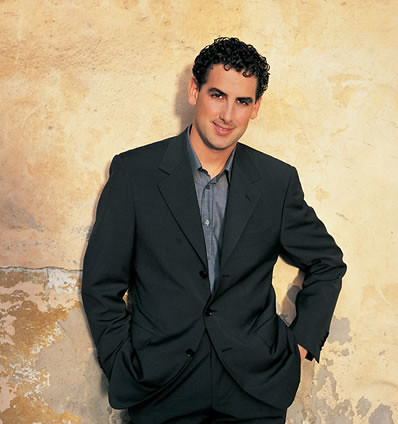Sem hesitar um só segundo, pessoalmente, considero Juan Diego Flórez o maior tenor ligeiro da actualidade. O episódio de Milão - em cuja ópera bisou uma ária (Ah mes amis, de La File du Régiment), facto inédito desde Chaliapin, nos idos anos 1930, em que o intérprete russo repetiu uma ária de O Barbeiro de Sevilha – apenas veio confirmar a minha convicção pessoal: a extraordinária agilidade alia-se a um timbre solar e radiante, que se fundem numa presença cénica notável, particularmente em papeis buffos.
«In February 2007 the Peruvian tenor Juan Diego Flórez made history at the Teatro alla Scala in Milan, when he nailed it twice. The last soloist to sing an encore on that hallowed stage was the Russian basso Feodor Chaliapin in Rossini’s “Barbiere di Siviglia” in 1933. The ban on the practice goes back to Toscanini. Since then only the chorus “Va, pensiero,” the song of the enslaved Israelites in Verdi’s “Nabucco,” has been repeated. Italians regard it almost as their second, superior national anthem.
“Such an uproar,” Mr. Flórez said this month at the Metropolitan Opera, between rehearsals for Laurent Pelly’s production of the opera opposite the scene-stealing soprano Natalie Dessay as Marie, the Daughter of the Regiment. (The premiere is on Monday.) Mr. Flórez had just flown in from Lima, Peru, where he had not only sung his first Duke in Verdi’s “Rigoletto” but also exchanged vows with the German-born Julia Trappe. The wedding was an encore too, the couple having been married privately last April in Vienna. Their ceremony at Lima Cathedral, the first wedding there since 1949, had the news media in a frenzy.
“I’d done encores of ‘Ah, mes amis’ before,” said Mr. Flórez, 35. “Many times, in Bologna, in Genoa, in Lecce, in Japan. But Milan can be a little snobbish. There’s an effort there to put singers down a bit. I couldn’t believe the fuss.” Even sports magazines took notice, comparing Mr. Flórez to Maradona. A replay at the Met is not impossible. The company’s general manager, Peter Gelb, says the house has no policy in this matter.»

(Juan Diego Flórez)
«In February 2007 the Peruvian tenor Juan Diego Flórez made history at the Teatro alla Scala in Milan, when he nailed it twice. The last soloist to sing an encore on that hallowed stage was the Russian basso Feodor Chaliapin in Rossini’s “Barbiere di Siviglia” in 1933. The ban on the practice goes back to Toscanini. Since then only the chorus “Va, pensiero,” the song of the enslaved Israelites in Verdi’s “Nabucco,” has been repeated. Italians regard it almost as their second, superior national anthem.
“Such an uproar,” Mr. Flórez said this month at the Metropolitan Opera, between rehearsals for Laurent Pelly’s production of the opera opposite the scene-stealing soprano Natalie Dessay as Marie, the Daughter of the Regiment. (The premiere is on Monday.) Mr. Flórez had just flown in from Lima, Peru, where he had not only sung his first Duke in Verdi’s “Rigoletto” but also exchanged vows with the German-born Julia Trappe. The wedding was an encore too, the couple having been married privately last April in Vienna. Their ceremony at Lima Cathedral, the first wedding there since 1949, had the news media in a frenzy.
“I’d done encores of ‘Ah, mes amis’ before,” said Mr. Flórez, 35. “Many times, in Bologna, in Genoa, in Lecce, in Japan. But Milan can be a little snobbish. There’s an effort there to put singers down a bit. I couldn’t believe the fuss.” Even sports magazines took notice, comparing Mr. Flórez to Maradona. A replay at the Met is not impossible. The company’s general manager, Peter Gelb, says the house has no policy in this matter.»

(Juan Diego Flórez)
3 comentários:
Considero O Flórez "the real thing". Já tive a sorte de vê-lo ao vivo 3 vezes e sempre me surpreendeu. É notável a evolução que apresenta este último c.d. e á parte a uma nota desconfortáve na aria do Gilherme Tell roça a perfeição. Esperemos que continue a escolher o seus papéis com parcimónia e discernimento.
J. Ildefonso.
E pelos vistos no Met repetiu a proeza!
Ver aqui.
Gi,
Thanks ;-)
Enviar um comentário